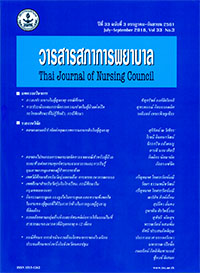Effect of Music Therapy on Sleep Quality in Older Persons
Keywords:
sleep quality, music therapy, older adultsAbstract
Objective: To examine how music therapy could beneft older adults’ sleep quality.
Design: Quasi-experimental research.
Procedure: Fifty-two participants were recruited according to the inclusion criteria
and equally assigned to the experimental and control groups (26 persons in each group).
The participants were older adults with poor sleep quality, living in Phitsanulok City’s
municipal area. The experimental group received one music therapy session (30-45
minutes) per day before bedtime, at least three days a week, for four consecutive weeks.
The control group, on the other hand, did not receive any music therapy. The instrument
used for assessing sleep quality was the Pittsburgh Sleep Quality Index (PSQI). Data
were analysed using descriptive statistics, independent t-test, and paired t-test.
Results: After receiving music therapy, the experimental group’s sleep quality
was signifcantly better that that of the control group (p < .001). In addition, the
experimental group displayed signifcantly higher sleep quality than before they received
music therapy (p < .001).
Recommendations: The fndings of this study indicate that music therapy can
improve sleep quality among older adults.
Downloads
References
2. Bloom HG, Ahmed I, Alessi CA, Ancoli IS, Buysse DJ, Kryger MH, et al. Evidence-based recommendations for the assessment and management of sleep disorders in older persons. J Am Geriatr Soc 2009;57(5): 761-89.
3. Farajnia S, Michel S, Deboer T, Tjebbe vanderLeest H, Houben T, Rohling JH, et al. Evidence for neuronal desynchrony in the aged suprachiasmatic nucleus clock. J Neurosci 2012;32(17):5891-9.
4. Sitasuwan T, Bussaratid S, Ruttanaumpawan P, Chotinaiwattarakul W. Reliability and validity of the Thai version of the Pittsburgh Sleep Quality Index. J Med Assoc Thai 2014;97(3):57-67. (in Thai)
5. Buysse DJ, Reynolds CF, Monk TH, Berman SR, Kupfer DJ. The Pittsburgh Sleep Quality Index: a new instrument for psychiatric practice and research. Psychiatry Res 1989; 28(2):193-213.
6. Luo J, Zhu G, Zhao Q, Guo Q, Meng H, Hong Z, et al. Prevalence and risk factors of poor sleep quality among Chinese elderly in an urban community: results from the Shanghai aging study. PloS one 2013;8(11): e81261.50
7. Janthayanont D, Kiattiweerasak U, Intharaprasong W, Anantawong V, ngampoopan M, Pongmorakot W, et al. Prevalence and influencing factors of insomnia and user behavior of hypnotic drugs in elderly at Wat-Intaram community, Phra Nakhon Si Ayutthaya district, Phra Nakhon Si Ayutthaya province Thailand. Journal of Prevention Medicine Association of Thailand 2012;2(1):12-24. (in Thai)
8. Choombuathong A, Chalopatham W, Dhongyooyen P, Chokchaiworrarat S, Thamwattana K, Changsap B, et al. Sleep quality and factors related to sleep and self-esteem in the elderly. Journal of Health Science 2017;24(5):833-43. (in Thai)
9. Helbig AK, Döring A, Heier M, Emeny RT, Zimmermann AK, Autenrieth CS, et al. Association between sleep disturbances and falls among the elderly: results from the German cooperative health research in the region of Augsburg-age study. Sleep Med 2013;14(12):1356-63.
10. Balbo M, Leproult R, Van Cauter E. Impact of sleep and its disturbances on hypothalamo-pituitary-adrenal axis activity. Int J Endocrinol 2010;18:509-19.
11. Pakanta I. Sleep problems and interventions. J Nurs Health Sci 2007;1(2): 31-8. (in Thai)
12. Chang KJ, Son SJ, Lee Y, Back JH, Lee KS, Lee SJ, et al. Perceived sleep quality is associated with
depression in a Korean elderly population. Arch Gerontol Geriatr 2014;59(2):468-73.
13. Khieophung J, Nicharojana LO, Intarasombat P, Krairit O. The effect of foot reflexology on quality of sleep in older persons with insomnia. Rama Nurs J 2013;17(1):90-107. (in Thai)
14. Wang CF, Sun YL, Zang HX. Music therapy improves sleep quality in acute and chronic sleep disorders:
A meta-analysis of 10 randomized studies. Int J Nurs Stud 2014;51(1):51-62.
15. American Music Therapy Association. What is music therapy? [Internet]. 2016. [cited 2017 Jan 17]. Available from: https://www.musictherapy.org
16. Padmanabhan R, Hildreth AJ, Laws D. A prospective, randomised, controlled study examining binaural beat
audio and pre-operative anxiety in patients undergoing general anaesthesia for day case surgery. Anaesthesia
2005;60(9):874-7.
17. Solanki MS, Zafar M, Rastogi R. Music as a therapy: role in psychiatry. Asian J Psychiatr 2013;6(3):193-9.
18. Jamkangwan Y. The effect of meditation and meditation music on sleep quality among elderly in Wadsanawead
Home for the aged [Master Thesis]. Bangkok: Chulalongkorn University; 2006. (in Thai)
19. Klaphajone J. Music Therapy [Internet]. 2010. [cited 2016 Oct 11]. Available from: https://www.med.cmu. ac.th/dept/rehab/2017/en/ctscan/13-abdomenradiology/81-music-therapy. html
20. Mofredj A, Alaya S, Tassaioust K, Bahloul H, Mrabet A. Music therapy, a review of the potential therapeutic
benefts for the critically ill. J Crit Care 2016;35: 195-9.
21. Polit DF, Beck CT. Nursing research: principles and methods. 7th ed. Philadelphia: Lippincott Williams
& Wilkins; 2008.
22. Intarasombat P. Assessment of health status in the elderly. Rama Nurs J 1996;2(3):44-56. (in Thai)
23. Chan MF, Chan EA, Mok E. Effects of music on depression and sleep quality in elderly people: a
randomised controlled trial. Complement Ther Med 2010;18(3-4):150-9.
24. Lai HL, Good M. Music improves sleep quality in older adults. J Adv Nurs. 2006;53(1):134-44.
25. Meiner SE. Gerontologic Nursing-E-Book. New York: Elsevier Health Sciences; 2013








